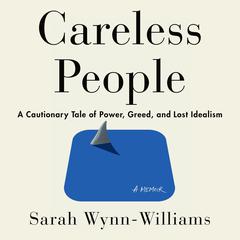 Play Audiobook Sample
Play Audiobook Sample
The Hour between Dog and Wolf: Risk Taking, Gut Feelings, and the Biology of Boom and Bust Audiobook
 Play Audiobook Sample
Play Audiobook Sample
Quick Stats About this Audiobook
Total Audiobook Chapters:
Longest Chapter Length:
Shortest Chapter Length:
Average Chapter Length:
Audiobooks by this Author:
Publisher Description
How risk taking transforms our body chemistry, driving us to extremes of euphoria and risky behavior—or stress and depression
In this eye-opening book, Coates—a former Wall Street trader and now a world-class neuroscientist—describes the role our biology plays in our risk-taking behavior. Coates brings his research to life by telling a story of fictional traders who get caught up in a bubble and then a crash. As these traders place their bets and live with the results, Coates looks inside their bodies to describe the physiology driving them into irrational exuberance and then pessimism. The result is a riveting tale and a penetrating insight into how traders'—and indeed all humans'—bodies guide their risk taking, endowing them with fast reactions and gut feelings; but how their biology can also lead them to extremes of euphoria or anxiety and stress, thereby wreaking havoc on the economy. Coates extends his conclusions to all types of high-pressure decision making—from the sports field to the battlefield.
Download and start listening now!
"Gave this 5 stars for the subject matter. Very readable, but mainly this is a topic that REALLY needs some airing. The impact of our biology on our behavior is profound. I've always thought "rational markets" were BS. Very interesting and quite fun to read."
— Laura (5 out of 5 stars)
Quotes
-
“[A] profoundly unconventional book. It’s also so absorbing that I wound up reading it twice…From the first page to the last, Coates challenges deep-seated assumptions.”
— Bloomberg Businessweek -
“It makes intuitive sense that biological responses inform the mood of the markets. This book puts flesh on that idea.”
— Economist -
“Compelling.”
— New Scientist -
“If anyone is qualified to unify the seemingly disparate subjects of financial markets and neurology, it’s John Coates…The Hour Between Dog and Wolf is a powerful distillation of his work—and an important step in the ongoing struggle to free economics from rational-actor theory.”
— Daily Beast -
“This scintillating treatise…is a provocative and entertaining take on the irrational exuberance—and anxiety—of the modern economy.”
— Publishers Weekly -
“A former financial trader, Coates combines his real-world experience and his clinical study of human physiology into a story of Wall Street speculators in action…A provocative challenger to rational-choice views of high finance, Coates makes an exceptionally clear, readable presentation that is bound to influence arguments about the regulation of Wall Street.”
— Booklist -
“Coates…brings an educated, experienced eye to this examination of the biological side of the financial markets…Coates uses concrete examples to make understandable both the financial and neurological complexities that are central to his argument. Well-presented and intriguing.”
— Kirkus Reviews -
“A vivid and brilliantly written narrative: by integrating his knowledge of neuroscience with his experience as a Wall Street trader, Coates pulls back the curtain on the physiological mechanisms that prepare some individuals to thrive and others to be devastated by confronting risk.”
— Stephen W. Porges, director, Brain-Body Center, Department of Psychiatry, University of Illinois at Chicago -
“John Coates brings finely honed scientific insight to his insider’s look at the world of high-wire high finance to produce a vivid depiction of the minds, brains, and bodies of economic movers and shakers living on the edge.”
— Gabor Maté, MD, author of When the Body Says No: The Cost of Hidden Stress -
“A terrific read—better than any amount of economic analysis because it explains what lies at the root of economic disaster—those biological drivers that cause sane and clever people to make catastrophic decisions. Every banker should be made to read it.”
— Rita Carter, author of Mapping the Mind
Awards
-
A Financial Times Best Book of the Year in 2012 for Science
-
Finalist for the 2012 Wellcome Trust Book Prize for Nonfiction
The Hour between Dog and Wolf Listener Reviews
- — marius simon, 11/14/2021
-
" had some interesting stuff but just not that interesting... reads like neurology for dummies "
— Gary, 12/19/2013 -
" Finance with human neurology and biology. "
— BLACK, 12/9/2013 -
" Cortisol ridden Society "
— Poopathi, 7/21/2013 -
" Excellent book, especially for those in finance. Its merits extend far beyond the field, though--offering insight into the biochemical reactions shaping individuals and the social systems we interact with. "
— Josiah, 5/16/2013 -
" This book was really excellent at explaining the way your brain and your body work together. Although he had insightful things to say about the finance industry, it was about much more than the trading floor. I would definitely recommend it. "
— Susan, 11/23/2012 -
" Chemistry and philosophy balances the economics - it's not just about Wall Street. And makes me want to read more Aristotle, too. "
— Cathy, 10/9/2012
About John Coates
John Coates is a senior research fellow in neuroscience and finance at the University of Cambridge. After completing his PhD, he worked for Goldman Sachs, Merrill Lynch, and Deutsche Bank in New York, where he observed the powerful emotions driving traders. He returned to Cambridge in 2004 to research the effects of the endocrine system on financial risk taking. His work has been cited in several publications, including the New York Times, Wired, and the Economist, and he has appeared on Good Morning America, CBS Evening News, and the BBC. His writing has been published in the Financial Times and Proceedings of the National Academy of Sciences, among other publications.
About Richard Powers
Richard Powers has published thirteen novels. He is a MacArthur Fellow and received the National Book Award. He won the Pulitzer Prize for Fiction for The Overstory, and Bewilderment was shortlisted for the Booker Prize.























